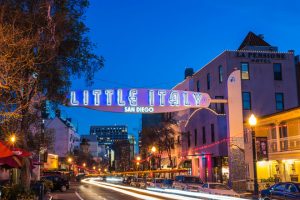[cross-posted at BHL and POT]

In June 1963, when Nathaniel Branden published a piece on “Inherited Wealth” in The Objectivist Newsletter, he was still the beloved disciple of Ayn Rand, who reprinted his piece in her 1966 collection Capitalism: The Unknown Ideal, and continued to include it in subsequent editions despite her break with Branden in 1968. As Rand famously did not allow opinions deviating even in the slightest from her own to appear in journals or books that she edited, we can assume Branden speaks for Rand when he writes:
A free, competitive economy is a constant process of improvement, innovation, progress; it does not tolerate stagnation. If an heir who lacks ability acquires a fortune and a great industrial establishment from his successful father, he will not be able to maintain it for long; he will not be equal to the competition. In a free economy, where bureaucrats and legislators would not have the power to sell or grant economic favors, all of the heir’s money would not be able to buy him protection for his incompetence; he would have to be good at his work or lose his customers to companies run by men of superior ability. There is nothing as vulnerable as a large, mismanaged company that competes with small, efficient ones. …
It is a mixed economy – such as the semi-socialist or semi-fascist variety we have today – that protects the nonproductive rich by freezing a society on a given level of development, by freezing people into classes and castes and making it increasingly more difficult for men to rise or fall or move from one caste to another; so that whoever inherited a fortune before the freeze, can keep it with little fear of competition, like an heir in a feudal society.
Here Branden, and by presumption Rand, are endorsing a crucial part of the left-libertarian idea of competition as a levelling force. The quotation makes an interesting pairing with a remark of Murray Rothbard’s in a 1966 letter:
For some time I have come to the conclusion that the grave deficiency in the current output and thinking of our libertarians and “classical liberals” is an enormous blind spot when it comes to big business. There is a tendency to worship Big Business per se … and a corollary tendency to fail to realize that while big business would indeed merit praise if they won that bigness on the purely free market, that in the contemporary world of total neo-mercantilism and what is essentially a neo-fascist “corporate state,” bigness is a priori highly suspect, because Big Business most likely got that way through an intricate and decisive network of subsidies, privileges, and direct and indirect grants of monopoly protection.
Yet if Rand, Branden, and Rothbard all accepted this crucial aspect of left-libertarian analysis, then a) where did Rothbard depart from Rand and Branden, and b) where did all three depart from left-libertarianism as we understand it today? (On the specific issue of economic inequality, I mean – not getting into the various other areas of disagreement.)

A crucial difference dividing Rothbard from Rand and Branden is that Rand and Branden do not seem to fully recognise the implication of their insight that under present circumstances the “unproductive rich” can maintain their position “with little fear of competition.” If they did, they’d have to agree with Rothbard that “bigness is a priori highly suspect” in the present-day economy, given the likelihood that it is the product of “subsidies, privileges, and direct and indirect grants of monopoly protection.” Rand, by contrast, famously declared big business a “persecuted minority,” a formulation ridiculed by Rothbard. While endorsing the premise that government controls insulate the rich from competition and make it difficult for newcomers to rise up, Rand fails to draw the logical conclusion that any firms that do manage to become enormously wealthy in the present-day economy are in most cases likely to have achieved their status at least in large part via government favoritism, and so are proper objects of suspicion, not celebration and defense.
Thus Rothbard is more consistent on this point than Rand and Branden, and so is closer to left-libertarianism. This is presumably in part because he had read and embraced the New Left historical discoveries, by thinkers like Gabriel Kolko, James Weinstein, and William Appleman Williams, of the actual historical role of big business in American history, showing that the Gilded Age magnates that Rand idolised were indeed mostly state-supported parasites too – discoveries that Rand never showed much interest in. (Later Randians eventually got around to discovering Kolko, and responded by going on the attack; see, e.g., here and here. A left-libertarian response to the contemporary Randian critique of Kolko is forthcoming in the Molinari Review.)

Where Rothbard parts company with left-libertarianism is that his suspicion of bigness is limited; while “in the contemporary world” vast concentrations of wealth are suspect, he writes that “big business would indeed merit praise if they won that bigness on the purely free market” – which seems to imply that he thinks enormous, systematic, pervasive, and longterm economic inequalities would indeed be possible in a free market – whereas left-libertarianism denies this, since it would be difficult to sustain such inequalities if producers were free to imitate what others were doing to become rich.
Of course there are differences in talent, as in Nozick’s “Wilt Chamberlain example,” that would serve as a bar to perfect imitation. But a glance at the wealthiest firms and individuals – in popular parlance, the “one percent,” a term actually coined by left-libertarian Karl Hess – shows the persistent role of government privilege in maintaining their status; they did not get there or stay there by talent alone.
In Man, Economy, and State, Rothbard does recognise that a single large firm dominating the entire economy would be impossible in a free market, owing to its insulation from market feedback:
In order to calculate the profits and losses of each branch, a firm must be able to refer its internal operations to external markets for each of the various factors and intermediate products. When any of these external markets disappears, because all are absorbed within the province of a single firm, calculability disappears, and there is no way for the firm rationally to allocate factors to that specific area. The more these limits are encroached upon, the greater and greater will be the sphere of irrationality, and the more difficult it will be to avoid losses. One big cartel would not be able rationally to allocate producers’ goods at all and hence could not avoid severe losses.
But Rothbard does not take the further step of recognising that insulation from market feedback is a matter of degree, so that in a free market diseconomies of scale would begin to kick in well before a single firm dominated the entire market. That is why left-libertarians expect a much flatter free-market landscape than the ones envisioned by Rand, Branden, and even Rothbard.





